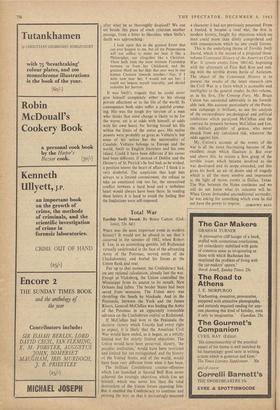Total War
Terrible Swift Sword. By Bruce Catton. (Gol- lancz, 52s. 6d.) WHAT was the most important event in modern history? It would not be absurd to say that it occurred in the summer of 1862, when Robert E Lee, in an astonishing gamble, left Richmond virtually undefended in the face of the advancing Army of the Potomac, moved north of the Chickahominy and hurled his forces at the Union flank and rear.
For up to that moment, the Confederacy had, on any rational calculation, already lost the war. Except at Vicksburg, the Union controlled the Mississippi from its source to its mouth. New Orleans had fallen. The border States had been saved from secession. The Union navy was throttling the South by blockade. And in the Peninsula, between the York and the James Rivers, General McClellan was leading the Army of the Potomac in an apparently irresistible advance on the Confederate capital at Richmond.
If McClellan had won in the Peninsula the decisive victory which Lincoln had every right to expect, it is likely that the American Civil War would have ended, as it began, as a strictly limited war for strictly limited objectives. The Union would have been preserved, slavery, 'the peculiar institution,' would have been restricted and limited but not extinguished, and the history of the United States, and of the world, would have been very different from what it has been.
The brilliant Confederate counter-offensive which Lee launched at Second Bull Run never achieved the strategic objectives which Lee set himself, which was never less than, the total destruction of the Union forces, opposing him. But it enabled the Confederacy to continue and prolong the war, so that it increasingly assumed a character it had not previously possessed. From a limited, it became a total war, the first in modern history, fought for objectives which no man could more than dimly comprehend and with consequences which no one could foresee.
This is the underlying theme of Terrible Swift Sword, which is the second of a projected three- volume Centennial History of the, American Civil War. It covers events from 1861-62, beginning with the aftermath of First Bull Run and end- ing with the terrible drawn battle of Antietam. The object of the Centennial History is to present the results of the latest research into the Civil War in a form which is accessible and intelligible to the general reader. In this' volume, as in his first, The Coming Fury, Mr. Bruce Catton has succeeded admirably in his formid- able task. His account particularly of the Penin- sula campaign is, brilliant, as are his analysis of the extraordinary psychological and political inhibitions which paralysed McClellan and the contrast he presents between McClellan and Lee, the military gambler of genius, who never shrank from any calculated risk, whatever the odds against him.
Mr. Catton's account of the events of the war is all the more fascinating because of the excellent maps which illustrate it. But over and above this, he retains a firm grasp of the terrible issues which became involved as the war developed and its scope extended, and this gives his book an air of doom and of tragedy which is all the more sombre and impressive in the light of recent events in Dallas, Texas. The War between the States continues and we still do not know what its outcome will be. When Grant demanded unconditional surrender, he was asking for something which even he did not have the power to impose. GORONWY REES






































 Previous page
Previous page